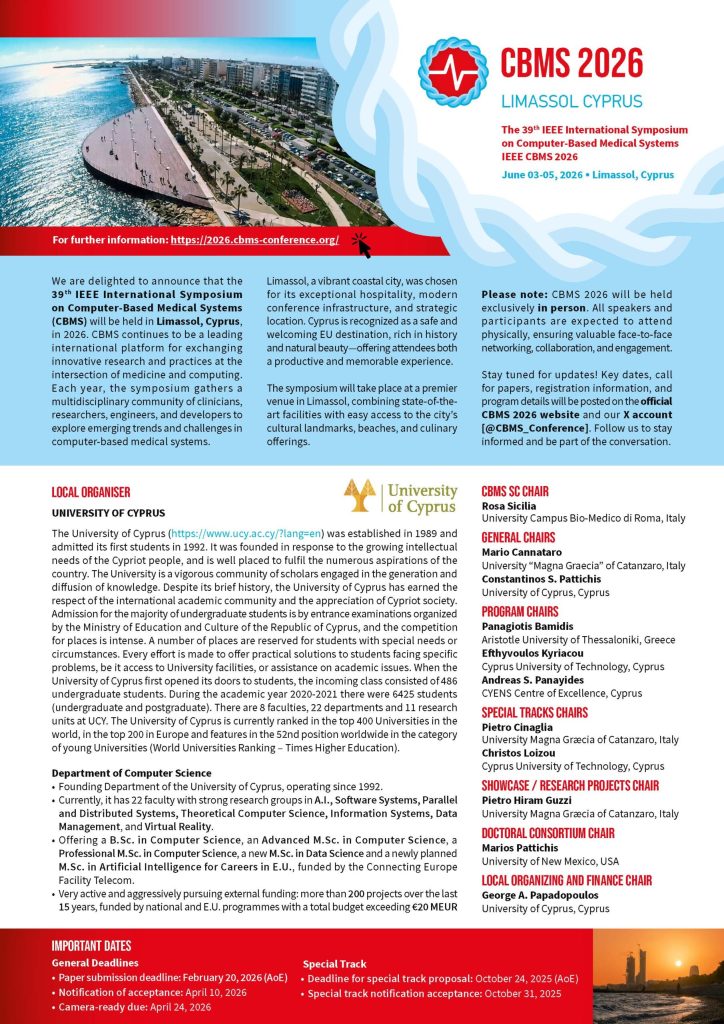June 03-05-2026, Limassol, Cyprus
Special Track on Generalizable & Explainable AI for the Care Continuum of Neurodegenerative Diseases

The 39th IEEE International Symposium on Computer-Based Medical Systems
IEEE CBMS 2026
June 03-05, 2026 Limassol, Cyprus
CBMS 2026 is a leading international symposium bringing together researchers, clinicians, and engineers to advance innovation in computer-based medical systems. The conference provides a multidisciplinary forum for presenting cutting-edge research, discussing emerging challenges, and fostering collaboration through high-quality, in-person engagement.
About the Special Track
Artificial intelligence (AI) is reshaping how we detect, stage, and monitor neurodegenerative diseases such as Alzheimer’s, Parkinson’s, Amyotrophic Lateral Sclerosis (ALS), and related conditions. From imaging to wearable devices and mobile platforms, digital biomarkers enable earlier detection, continuous real-world monitoring, and truly personalized interventions.
Yet translating these advances into clinical workflows remains challenging as models often behave as black boxes; performance can degrade under domain shift; multimodal data are messy, incomplete, or siloed; and regulatory-grade evidence requires calibrated uncertainty, fairness assessments, transparency, and reproducibility. For clinic-to-home care pathways, methods must be interpretable and robust across heterogeneous devices, sites, and populations, while preserving privacy and aligning with clinician workflows.
This special track aims to bring together researchers to advance clinically interpretable AI for digital biomarkers of neurodegeneration across the clinic–home continuum.
Research Themes
(Including but not limited to)
Interpretability & Uncertainty
Robustness & Domain Shift
Annotation Scarcity
Multimodality & Missing Data
Fairness & Ethics
Topics of Interest
(not limited to)
Concept-based, prototype, counterfactual, causal, and rules-based approaches; global vs. local explanations for model transparency.
Uncertainty quantification, reliability diagrams, conformal prediction, and detection of out-of-distribution samples or domain shifts.
Extraction and validation from speech, language, handwriting, gait and kinematics, ocular or retinal metrics, biosignals (EEG, ECG, EMG, GSR), and wearable or smartphone-based sensing — including passive monitoring.
Interpretable MRI/PET pipelines for early detection, differential diagnosis, disease staging, progression modeling, and treatment response prediction.
Late, early, or intermediate fusion strategies using product-of-experts, mixture-of-experts, graph, or transformer architectures.
Self-, semi-, and multiple-instance learning; curriculum and active learning; training under label noise and uncertain annotations.
Site-robust modeling, harmonization, synthetic data augmentation, and test-time adaptation for cross-center reliability.
Clinician- and patient-facing explanations, iterative model refinement, and UI/UX design to foster trust and adoption.
Integration into clinical workflows (including telemedicine), remote monitoring, adherence analysis, and real-world utility assessment.
Multi-site datasets, open-source tools, reproducible baselines, and reports of negative or neutral results with rigorous error analysis.
Expected Types of Contributions
Authors are invited to submit original, previously unpublished research papers. Papers should be written in English strictly following IEEE two-column format. For formatting instructions and templates see the IEEE Web page at https://www.ieee.org/conferences/publishing/templates.html. Papers can be submitted by means of EasyChair after the submission page has been released (see conference web page).
The following types of submissions are accepted:
- Full research papers and experience papers with a maximum length of 6 pages, including references and appendices. It is possible to extend the paper length up to 8 pages by paying for each extra page.
- Short papers and position papers with a minimum length of 3 pages and a maximum length of 4 pages, including references and appendices. It is not possible to extend the length of short papers.
Submission
Authors should follow the IEEE CBMS 2026 formatting and submission guidelines and select the “GEAI4ND” Special Track at submission time. We welcome:
Original research papers
- Resource/benchmark papers (datasets, tools, leaderboards, reproducible baselines)
- Application/clinical studies (pilot, prospective, multi-site, or real-world evaluations)
- Negative/neutral results with thorough error and ablation analyses
- Vision/position papers that crystallize standards, reporting, or governance for interpretable digital biomarkers
All submissions will be peer-reviewed for originality, technical quality, interpretability/clinical relevance, rigor of evaluation, and reproducibility.
General Deadlines
- Paper submission deadline: February 20, 2026 (AoE)
- Notification of acceptance: April 10, 2026
- Camera-ready due: April 24, 2026
Expected Audience
Researchers and practitioners in medical AI, biomedical engineering, neurology, neuroimaging, signal processing, HCI, clinical translation, including industry and healthcare partners.
Programme Committee Members
- Gianluca Amprimo, Politecnico di Torino (Italy)
- Andreas Miltiadous, University of Ioannina (Greece)
- Claudia Ferraris, Consiglio Nazionale delle Ricerche, CNR-IEIIT (Italy)
- Gabriella Olmo, Politecnico di Torino (Italy)
- Alexandros Tzallas, University of Ioannina (Greece)
- Irene Rechichi, Politecnico di Torino (Italy)
- Lorenzo Martini, Politecnico di Torino (Italy)
- Serena Cerfoglio, Politecnico di Milano (Italy)
- Katerina Tzimourta, University of Western Macedonia (Greece)
- Nikolaos Giannakeas, University of Ioannina (Greece)
- Vasileios Aspiotis, University of Ioannina (Greece)








